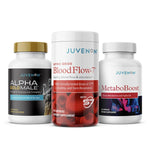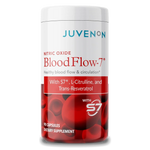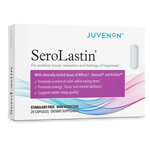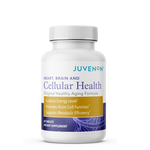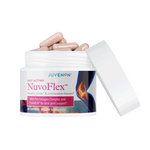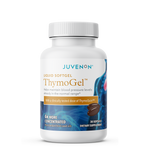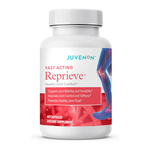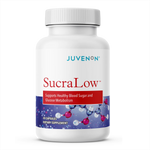
Why is comparing L-carnitine vs acetyl-L-carnitine important in keeping a good health and well-being? There are several reasons for that, and to know what these are, we will talk about them in this article. Keep reading to find out more.
In this article:
What Is L-Carnitine?What Is the Difference Between Acetyl-L-Carnitine and L-Carnitine?
What Are Some Other Benefits of ALC?
How Can It Affect Physical and Mental State?
Where Does Acetyl-L-Carnitine (ALC) Come From?
What Is the Right Dosage for ALC?
Dr. Treadwell Answers Your Questions About Juvenon Cellular Health® Supplement
L-Carnitine Vs Acetyl-L-Carnitine: What You Should Know
What Is L-Carnitine?
To better understand the comparison of L-carnitine vs acetyl-L-carnitine (LC vs ALC), let’s first define what LC is. It is an amino acid derivative usually consumed as a supplement.
It plays an important role in energy production as it aids in transporting fatty acids into the mitochondria of the cells. The mitochondria function as engines of your cells, which help burn fat for energy use.
Your body can naturally create L-carnitine from methionine and lysine, which are both amino acids.
What Is the Difference Between Acetyl-L-Carnitine and L-Carnitine?

Structurally, the difference between L-carnitine and acetyl-L-carnitine is ALC is an LC molecule containing an attached acetic acid group. This structural difference is small, but it produces a considerable difference in the biochemical properties of the molecule and, consequently, in its effects on metabolism.
Acetyl-L-carnitine can substitute for L-carnitine in fat metabolism; however, as described below, recent studies have resulted in the identification of several biological characteristics that are unique to acetyl-L-carnitine.
Note that the acetyl group also includes N-acetyl cysteine (NAC). Derived from the cysteine amino acid, this super antioxidant has been shown to prevent the formation of free radicals in the brain.
Like the nutrient ALC, it is an active ingredient in such Juvenon supplements as Youthful Memory®. This cysteine amino acid derivative increases glutathione, an essential antioxidant that occurs in the brain.
It also helps maintain memory and other cognitive functions as we age.
What Are Some Other Benefits of ALC?
This important nutrient offers several significant benefits to cellular health:
1. ALC Helps Restore Nerve Function
The acetyl group on acetyl-L-carnitine can be donated to a specific acceptor molecule, choline, to form the neurotransmitter acetylcholine, which helps restore nerve function. This activity is believed to be at least partly responsible for the improved mental function resulting from acetyl-L-carnitine supplementation in patients with cognitive disorders, including Alzheimer’s disease, Parkinson’s disease, chronic fatigue syndrome, and other disorders of the nervous system.
Additional studies supporting a neuroprotective role for acetyl-L-carnitine are those demonstrating an improvement in symptoms of peripheral nerve damage, or peripheral neuropathy, common to diabetic patients.
2. ALC Helps Produce Energy

The acetyl group can also be utilized for the production of energy in the Krebs cycle. This donation increases the availability of an important cofactor (CoA) required for the conversion of carbohydrates to energy.
Sufficient carnitine levels, derived from acetyl-L-carnitine, are necessary to transport toxic, non-metabolizable, short-chain fatty acids out of the mitochondria and thus to free up the cofactor, CoA. A deficiency in acetyl-L-carnitine promotes a corresponding decrease in this cofactor, and consequently impaired energy production from both fats and carbohydrates, thus affecting energy levels in all cells of the body.
3. ALC Benefits the Nervous System
A key L-carnitine vs acetyl-L-carnitine difference has to do with the effect on the nervous system. ALC, but not LC, has been demonstrated to protect the nervous system, partly because it is more readily transported into the nervous system.
Recent studies with humans have indicated many of the age-associated disorders involving the nervous system, such as depression, impaired cognition, and decreased mental alertness, may be at least partially a response to a deficiency in ALC.
4. ALC Defends the Mitochondria
Another important comparison of L-carnitine vs acetyl-L-carnitine centers on the mitochondria, the organelles found in living cells facilitating respiration and energy production. ALC, but not LC, protects the mitochondria.
A recent finding demonstrated that a deficiency in ALC affects the structure and energy-producing capacity of the mitochondria. The mitochondria are responsible for producing virtually all the energy required by the cell.
So, any subtle change in their structure can have a tremendous effect on the cell’s energy reserves. ALC has been demonstrated to revitalize mitochondria by restoring levels of a key mitochondrial component, a phospholipid known as cardiolipin, which is susceptible to age-associated reduction in levels.
Cardiolipin can be envisioned as the glue securing and organizing, or better yet, orchestrating, the energy-producing machinery of the mitochondria.
The acetic acid group on ALC allows it to enter the mitochondria more readily than LC and consequently more rapidly perform its beneficial effects. An additional enzyme must act on LC before it can enter the mitochondria.
5. ALC Aids in Male Fertility

For men who are struggling with fertility, ALC may help correct this problem when taken orally along with L-carnitine. This LC molecule can help increase sperm motion and pregnancy rate in men.
ALC may also help increase sperm count and movement in men with infertility caused by inflammation due to Chlamydia infection.
6. ALC Boosts Brain Strength
One important benefit of ALC is its anti-aging nootropic properties (smart drugs). These help improve cognitive function.
Nootropic Definition: Substances, usually supplements or drugs, which improve brain functions such as memory, learning, and cognition.
The acetyl group the molecule and crosses your blood-brain barrier to reach your brain nerves. This activity can aid in improving your memory and learning functions, and even your mood.
7. ALC Helps Burn Fat
Upon entering your body, ALC converts into carnitine, which is crucial for burning fat. A portion of your carnitine transports long-chain fatty acids into your mitochondria where they burn these acids for energy.
Given your insulin is low, your mitochondria begins to convert stored fat into fuel, which is what you are aiming in weight loss. Carnitine helps metabolize fat, and if carnitine is low, fat burning can be difficult.
How Can It Affect Physical and Mental State?
These characteristics raise some questions. First, why would a deficiency in a fat-burning chemical affect your physical as well as mental state?
The two systems of the body requiring the most energy are the muscular and nervous systems. It has been estimated that for normal function and health, the brain requires the amount of energy present in a quarter pound of sugar every day.
A lack of energy in brain and muscle tissues will be exhibited as impaired physical and mental activity. If the deficiency persists for a sufficient period of time, it can lead to disease.
Although the brain normally does not use fat for energy, (it prefers glucose from carbohydrates), except under conditions of fasting or starvation, it, nevertheless, can be adversely affected by a deficiency in ALC, because of all the four items described above.
Where Does Acetyl-L-Carnitine (ALC) Come From?

Although the cells of the body do produce this important chemical, it is widely believed that the major source of the compound is derived from the diet. Meat, especially lamb, is the major dietary source of ALC, and the basis for why vegans can be deficient in ALC, since plants contain insignificant amounts.
Studies with animals, like rats, have recently demonstrated a gradual decline in plasma levels of ALC with age, which correlates with age-associated energy decline. Additional studies with humans have indicated a steady decline in ALC, beginning with the fourth decade of life.
This, too, is correlated with energy decline. This decline in plasma ALC may be a reflection of inefficient absorption from the diet and/or reduced synthesis.
Both are believed to be responsible for the lower levels of ALC as we age. In view of the age-associated decline in the ability of the body to synthesize and absorb ALC, use of dietary supplements to ensure adequate ALC is a growing trend in healthy aging.
For years, scientists have theorized that, in view of the biochemical properties of acetyl-L-carnitine (ALC; also abbreviated as ALCAR), it should have a beneficial effect on brain function. Many clinical trials in the U.S. and Europe have looked into the ability of ALC to slow the progression of natural cognitive impairment associated with old age.
Studies have varied in length from 3 to 12 months, and doses from 1.5 to 3 grams/day.
Because of different study parameters, interpretation of the combined results is a challenging endeavor. But, in a recently published study, a group at Imperial College University in London has conducted a “meta-analysis,” which gathers data from a large number of studies and uses statistical techniques to reach overall conclusions.
The results demonstrated a beneficial effect of ALC, compared to placebo, in protecting against age-related cognitive impairment. In addition, ALC was well tolerated.
What Is the Right Dosage for ALC?
Carnitine supplementation is a good option if you want to maximize the benefits of the acetyl-l-carnitine molecule.
What you need to remember though is timing and increment matter in taking this supplement.
This means you can try taking it in small amounts first, and then gradually increase the longer you take it. You can take 1-3 g of LC per day.
One gram is a good place to start. From there, you may increase or decrease the dose, depending on your needs or as directed by a health practitioner./
Overall, this micronutrient can do much for the body, and more than just burn fats. Regular intake may be helpful to keep you feeling young.
Juvenon offers Cellular Health Tablets rich in ALC. Try them today for boosted cell energy.
This Research Update column highlights findings related to recent scientific inquiry into the process of human aging. It is not intended to promote any specific ingredient, regimen, or use and should not be construed as evidence of the safety, effectiveness, or intended uses of the Juvenon product. The Juvenon label should be consulted for intended uses and appropriate directions for use of the product.
Dr. Treadwell Answers Your Questions About Juvenon Cellular Health® Supplement
What is the difference between acetyl-L-carnitine and L-carnitine? Which is more effective in combination with alpha-lipoic acid?
Significant evidence indicates that acetyl-L-carnitine (ALC) is more effective than L-carnitine in stimulating energy production and cognitive function. See nearby article for details on the structural and biochemical advantages of ALC.
ALC works especially well with alpha lipoic acid. For example, lipoic acid stimulates the enzyme involved in the transfer of the acetyl group on ALC to the acceptor choline, to form the neurotransmitter, acetylcholine. The two compounds complement one another in the production of energy, with alpha lipoic acid serving as a key cofactor in the Krebs cycle, and ALC feeding the cycle energy by supplying subunits in the form of acetyl moieties to be converted to energy. In developing the Juvenon Energy Formula, Juvenon scientists experimented with other anti-oxidants and found that alpha lipoic acid gave the best results.
Benjamin V. Treadwell, Ph.D., is a former Harvard Medical School associate professor and member of Juvenon’s Scientific Advisory Board.
Editor’s Note: This post was originally published on May 12, 2020, and has been updated for quality and relevancy.

